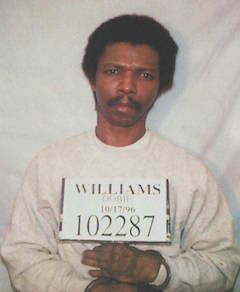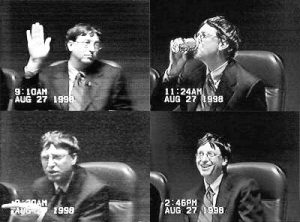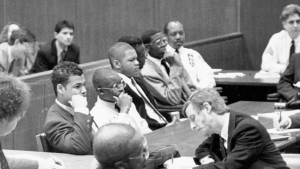Throughout the history of the United States, there have been tens of thousands of murders, rapes, and other heinous crimes. For over two-hundred years, the United States government intended to establish a fair and judicial system of justice. However, as countless cases of accused criminals have shown, our judicial system is not all that equal. As cases from the past prove, there have been instances where errors in the judicial system occur, resulting in unfair trials. Even worse, some of those inmates who have had unfair trials were convicted and in some cases, even sentenced to death row. So, is our judicial system all that just for all? In many cases it is just; however, in too many cases throughout our history, the system has been unfair to a number of accused individuals. An example of this is the trial of Dobie Williams, a young black man accused of the murder of a middle-aged white woman, Sonja Knippers on July 8, 1984. Dobie Williams had an unfair trial due to his race, few accommodations for his mental health, and an inept court-appointed attorney that he was provided.

Geography and race had a role to play in the unfair trial of Dobie Williams. Knippers was a white woman in her early forties, who was brutally killed in the bathroom of her southern home, located in Many, a small town in Lousiana, which was not a good place for Dobie, an African American, to be accused of murdering a white woman. Sister Hellen Prejean, a writer and a spirtual adviser for death row inmates, who accompanied Dobie throughout his trials and execution dates, explains that Dobie never had a fair trial due to being assigned an all-white jury during his hearing for the murder of Knippers; in addition, all of the judges, district attorneys, and the local media during the time were all white, further explaining possible prejudices that could stacked the odds against him. Many is a small town located in north central Louisiana, and it was not a city. It was a small, quiet, and mostly white town, where murder, or basically any other crime, was erratically unusual, especially in 1984, meaning that when crimes did happen, it was a huge deal. Consequentially, being a black individual accused of murdering a middle-aged white woman in a small town in the south was a bad situation to be in. We will never know for sure whether an all-white jury had anything to do with the conviction of Dobie Williams. But it still was not looking good for him, due to where the murder had taken place and the significance of the crime. In her book, Prejean, realizing the social injustices in Louisiana during the 1980’s, exclaimed that Dobie was, “in big trouble.”1 Prejean understood how geography had a role to play in the conviction of Dobie. Innocent or guilty, being a black minority during the time of Dobie’s trial in a small town located in the heart of the south was no easy thing to endure.

There are similar cases to Dobie’s in which a fair trial was not given because of such geography. In 1982 in Greenwood South Carolina, race played a significant role in the conviction of twenty-three-year-old Edward Lee Elmore, who was accused of the rape and murder of seventy-five-year-old Dorothy Edwards. According to Bishop Emmanuel Spearman, who was pastor to Edward, race played a major role in the trial.2 Spearman made a plausible statement about the trial because Edward, the African American, was accused of the murder of an elderly white woman in 1982, which was a severe offense. This could have given him an unfair trial due to the murder taking place in a small town in Greenwood, South Carolina, where just like Many, murder was rare. Something as significant as both murder and rape of an elderly white woman in a small, southern town would be considered heinous.
Dobie Williams did not have well-suited accommodations. In the 1980’s, individuals such as Dobie who had an IQ below 70, did not yet have the defense based on the Supreme Court case, Atkins v. Virginia, which ruled that capital punishment is unconstitutional for defendants with mental retardation.3 This meant that below average IQ could not be used in defense of Dobie Williams until the Supreme Court case was actually ruled. This can be related to Edward Lee Elmore, who had an IQ below 70, which made it difficult for him to understand the questions that were being asked while defending himself in a courtroom, when he was asked questions by district attorney, William T. Jones, who said, “You want this courtroom to believe you’re this quiet don’t you?”4 Edward lacked the competence to understand how to effectively defend himself while being asked harsh questions, due to being mentally handicapped. Furthermore, according to Celia B. Fisher, studies have demonstrated that “contribution to legal decisions concerning competency and predictions of future violence places the defendant at the mercy of an imperfect and unjust system.”5 The study shows that a defendant’s mental status is critical in the fate of that individual who is being accused of a heinous crime. Dobie Williams was a mentally-handicapped individual on trial for a severe act, and who was unable to properly defend himself, thus resulting in him to be at the mercy of a flawed judicial system.

Dobie Williams grew up in an impoverished childhood, giving him no other choice but to be assigned Michael Bonnette, his overworked public defender for his case, who had limited experience in death penalty cases, giving him an unfair trial. Sister Helen Prejean exclaims, “They know the difference in treatment given the O.J’s of the world in contrast with the NoJ.’s, forced to accept overworked, underfunded, or inept attorneys to defend them.” The fact of an incompetent, overworked, and underpaid attorney being assigned to Dobie, resulted in him making mistakes that affected the whole trial. During his trial, Dobie’s overworked public defender failed to successfully acquire any independent forensic testing, resulting in him being unable to provide a proper counter to the prosecutor’s claim against him. This mistake allowed for the argument against Dobie to be uncontested for thirteen years. Furthermore, it was Dobie’s financial situation that not only affected his opportunity to be assigned a more effective private attorney, but it also prevented him from having certain tests performed that could have aided him during his trial.6
There are other cases that explain the error of our judicial system. The trial of Dobie Williams is just one case out of too many that has been unfair. According to Sister Helen Prejean, there have been numerous cases of inaccuracy by the state and federal courts, thus compelling them to free 117 innocent death row inmates since 1973.7 Prejean presents the dramatic statistic in her book, The Death of Innocents, which was published in 2004. Imagine what the number has been now since the book was published. In addition, in 2000, Illinois’s governor, George Ryan, proclaimed a moratorium for the death penalty of the state, confirming that 13 death row inmates have been exonerated in the past 23 years.8 The appalling statistics illustrate the probable flaw in the judicial system of the United States, making it more likely to believe that Dobie Williams had an unfair trial.
Minorities in southern areas who are accused and convicted of a crime are more highly exposed to unfair trials compared to other individuals. Even though the right to a public attorney is granted with the intention of an equal judicial system, in reality, that is just not the case. Dobie Williams could not afford a private attorney who had experience with the death penalty, resulting in him being unable to receive the proper defense that he deserved due to the inept, overworked, and underpaid public defender that he received. Dobie was unable to defend himself due to his below 70 IQ. With all of the facts in place, was the judicial system in the case of Dobie Williams all that just when there have been numerous accounts of accused inmates being exonerated due to a flaw in the system?
- Sister Helen Prejean, The Death of Innocents (New York: Random House, 2005), 19. ↵
- Life on Death Row, “Death Row Stories-Edward Lee Elmore,” 1:47-3:33, March 27, 2017, https://www.youtube.com/watch?v=aSCJkTPft5g&t=2s. ↵
- Celia Fisher, “Human Rights and Psychologists’ Involvement in Assessments Related to Death Penalty Cases,” Ethics and Behavior 23 no.1 (2013): 58. ↵
- Life on Death Row, “Death Row Stories-Edward Lee Elmore,”16:22 , March 27, 2017, https://www.youtube.com/watch?v=aSCJkTPft5g&t=2s. ↵
- Celia Fisher, “Human Rights and Psychologists’ Involvement in Assessments Related to Death Penalty Cases,” Ethics and Behavior 23 no.1 (2013): 60. ↵
- Sister Helen Prejean, The Death of Innocents (New York: Random House, 2005), 13-17. ↵
- Sister Helen Prejean, The Death of Innocents (New York: Random House, 2005), 17. ↵
- Robert Sigel, “Profile: Illinois Governor George Ryan has placed a moratorium on death penalty executions, citing the state’s shameful record of putting innocent people on death row,” NPR, January 31, 2000. ↵



74 comments
Micaela Cruz
The issues with our legal system, government and the leaders of our country have been going on for too long. The story of Dobie Williams, a case from what was stated in the article that didn’t go as it should have, is a prime example of how unfair the justice system can be to those who can’t or don’t have the full capability to defend themselves. Another issue that the United States has heavily dealt with for quite sometime is racial discrimination; in God’s eyes, we are all created equal and we are all brothers and sisters in Christ… why is it so hard for people to believe in this truth? It’s something I won’t ever be able to understand.
Bictor Martinez
It truly is not fair for the acquisition of Dobie Williams. Just because of the geography and race that Dobie was at, at the time is truly unfair. How can these factors make an impact on a person’s case? It truly is disgusting what the world has turned into. We say that our judicial system is completely fair, but in reality it is not. There are many cases where the person getting accused of a crime is not guilty yet they get sentenced to death. It is unfortunately something we will never change even if we all continue to deny it.
Adrian Cook
To this day there is an ongoing problem in America where unequal justice is being served. Minorities and African Americans are a big target in the world that lead to statistics that show if you’re any race besides Anglo American you’ll likely be stopped and cited for a minor offense. This is a big problem as so many people die everyday for small offenses that could’ve been prevented with the proper training of police officers. Racism is still around and needs to be controlled before we have segregation amongst citizens.
Reagan Meuret
Stories such as this really make me sick. It is so hard to imagine a man being falsely accused of anything, let alone something that would put me in jail for life. I try to imagine how I would feel if I was in Dobies shoes, and I can very easily say that the anger and sadness inside of me would be incredible. I feel so bad that his life was stripped away from him simply because people such as the all white jury did not like his skin color. I hope one day as a nation and world we can break the color barrier once and for all.
Emily Jensen
Many times in US history you are able to find cases that have the odds stacked against an innocent defendant. Whether it be due to race, religion, mental health issues, or any other reason, it is truly an unfair trial even before the start. This article covers one of those cases, the trial of Dobie Williams. I am glad we are able to recognize now how wrong the actions/beliefs were during that time, so that we can do our best to prevent history from repeating itself.
Christopher Vasquez
Racism has, and I presume always will be, a major topic that infiltrates its way into parts of our daily lives. This sick, disgusting view that people are inferior because they look or act differently than a certain group of people needs to stop. Dobie William’s case reflects the view that America had of minorities at the time. Not only was William being discriminated against because of his race but he was also taken advantage of because he was unable to defend himself properly, and what is worse is that the courtroom most likely knew this. This article not only highlighted the problem with racial bigotry but it also highlighted a problem with the death penalty: 13 people had been wrongly executed in 23 years, causing a moratorium on this practice until the mistakes could be eliminated. The judicial system needs to be fixed where it is broken; any area that favors one race over another or murders an individual incorrectly must be corrected immediately. If not for Dobie Williams, then at least for the future generations of America.
Robert Freise
The racial discrimination that was going on during the case of Dobbie Williams was exemplified due to it being in the south. Many falsely accused African Americans during this time and today are accused of crimes that they did not commit. Many racist police men and congressman use their power to target minority groups just because of their color of their skin. It truly disgusting and very unethical in a sense equality. Dobbie Williams was poor, because of the constant beat down of the African American race in the south over generations, if you were brought the way Dobbie was, do you think you could have obtained a fair trail? probably not..
Damian Jennings
Injustice is the right word to describe Dobie Williams trial. This man may not have had an education or money, but our society failed to realize that this man was a human being. It’s sad to see that helpless people are unfairly put on trial without any help and are discriminated. But our system still fails to provide these people with equity.
Aneesa Zubair
Dobie’s case is a sad one, especially considering that it took place in the 1980s, decades after the Civil Rights movement. I think this shows how our judicial system, despite many improvements that have occurred over the decades, still remains biased against minorities, people with mental disabilities, and people who can’t afford private lawyers. Thankfully juries are more diverse today, but we still see flaws in the judicial system, such as in the cases of immigrant children who have to represent themselves in court. Sometimes it’s hard to believe that an otherwise well-organized, impartial court system can actually allow things like that to happen.
Miguel Rivera
Trials and the judicial system in our country is there for a reason, I understand that it wasn’t used correctly but imagine if this man didn’t have the opportunity to be represented in court even if it was by an overworked and underpaid public defender? The system is still flawed and needs improvement but I am happy that he was able to walk away a free man in the end. If this country didn’t have that to start off with there would be mobs just killing or putting away people based on assumptions and hearsay. In the end, he should’ve walked away a free man from the start if he had a fair trial and more accommodations for him.